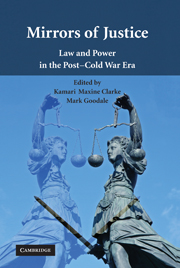Book contents
- Frontmatter
- Contents
- Editor Biographies
- Contributors
- Acknowledgments
- Introduction: Understanding the Multiplicity of Justice
- 1 Beyond Compliance: Toward an Anthropological Understanding of International Justice
- PART I JUSTICE AND THE GEOGRAPHIES OF INTERNATIONAL LAW
- 2 Postcolonial Denial: Why the European Court of Human Rights Finds It So Difficult to Acknowledge Racism
- 3 Proleptic Justice: The Threat of Investigation as a Deterrent to Human Rights Abuses in Côte d'Ivoire
- 4 Global Governmentality: The Case of Transnational Adoption
- 5 Implementing the International Criminal Court Treaty in Africa: The Role of Nongovernmental Organizations and Government Agencies in Constitutional Reform
- 6 Measuring Justice: Internal Conflict over the World Bank's Empirical Approach to Human Rights
- PART II JUSTICE, POWER, AND NARRATIVES OF EVERYDAY LIFE
- PART III JUSTICE, MEMORY, AND THE POLITICS OF HISTORY
- Epilogue: The Words We Use: Justice, Human Rights, and the Sense of Injustice
- Index
- References
5 - Implementing the International Criminal Court Treaty in Africa: The Role of Nongovernmental Organizations and Government Agencies in Constitutional Reform
Published online by Cambridge University Press: 25 January 2010
- Frontmatter
- Contents
- Editor Biographies
- Contributors
- Acknowledgments
- Introduction: Understanding the Multiplicity of Justice
- 1 Beyond Compliance: Toward an Anthropological Understanding of International Justice
- PART I JUSTICE AND THE GEOGRAPHIES OF INTERNATIONAL LAW
- 2 Postcolonial Denial: Why the European Court of Human Rights Finds It So Difficult to Acknowledge Racism
- 3 Proleptic Justice: The Threat of Investigation as a Deterrent to Human Rights Abuses in Côte d'Ivoire
- 4 Global Governmentality: The Case of Transnational Adoption
- 5 Implementing the International Criminal Court Treaty in Africa: The Role of Nongovernmental Organizations and Government Agencies in Constitutional Reform
- 6 Measuring Justice: Internal Conflict over the World Bank's Empirical Approach to Human Rights
- PART II JUSTICE, POWER, AND NARRATIVES OF EVERYDAY LIFE
- PART III JUSTICE, MEMORY, AND THE POLITICS OF HISTORY
- Epilogue: The Words We Use: Justice, Human Rights, and the Sense of Injustice
- Index
- References
Summary
INTRODUCTION
The persistence of violent conflicts in Africa and the world in general have resulted not only in untold human and material losses but also in egregious human rights abuses. The need to bring the perpetrators to account led to the establishment of several international tribunals to prosecute those persons and groups accused of committing gross human rights abuses. The employment of the ICC as an international justice mechanism in achieving peace, ensuring justice, and ending ongoing conflicts in Africa is now a reality. However, there is also tension between international justice mechanisms and local means of resolving ongoing and protracted conflicts in relation to the activities of the ICC in its first four investigations on the continent.
The ICC has jurisdiction to indict people accused of such international crimes as genocide, crimes against humanity, and war crimes. The Court has power to provide redress to victims and survivors of these crimes, and some argue that the mere presence of the ICC has a deterrent effect on future dictators and their collaborators. However, questions are being asked about whether the ICC alone can effectively end the conflicts or if other forms of transitional or restorative justice can be employed in achieving lasting peace and justice on the continent.
The emergence of international criminal justice regimes in Africa marks a clear departure from the past when leaders on the continent were immune from prosecution or criminal responsibility.
- Type
- Chapter
- Information
- Mirrors of JusticeLaw and Power in the Post-Cold War Era, pp. 106 - 130Publisher: Cambridge University PressPrint publication year: 2009
References
- 1
- Cited by



